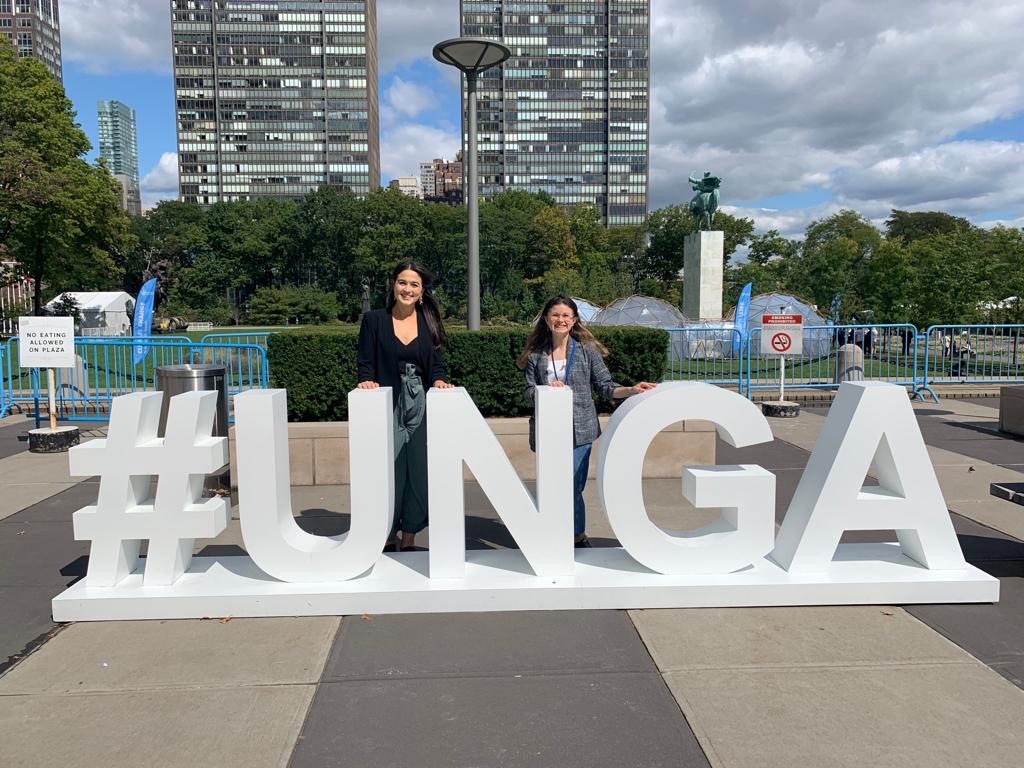
As the Global President of the world’s largest youth-led organization, I often expect to be the youngest person in the room.
I travel the world with the mandate to represent over 80,000 youth annually who either go abroad for cross-cultural exchanges through AIESEC or who facilitate these exchanges as members of the organization. I sit on panels, give keynotes, and attend events to emphasize, over and over and over again, that young people have a place at the decision-making table of our future.
At the end of September, I spent a week in New York City, attending the many events held in parallel to the 74th General Assembly of the United Nations. Each time I encountered a new young person during the course of my week was memorable.
Counting on just one hand, I can tell you about:
“The Activist” – Katie Eder, the Executive Director of The Future Coalition, who spoke on a panel about coordinating a nationwide youth-led movement for climate action.
“The Feminist” – Payal Jangid, an Indian youth activist, who received the Changemaker Award, one of three awards reserved for youth at the Goalkeeper’s Global Goals Awards, hosted by the Bill & Melinda Gates Foundation, for her fight to abolish child marriage in Rajasthan, India.
“The Diplomat” – Aya Chebbi, the African Union Youth Envoy, the second award winner of the night, who received the Campaign Award for her work mobilizing youth across the African continent.
“The CEO” – Gregory Rockson, co-founder and CEO of mPharma, the third award winner of the night, who received the Progress Award for his innovative work making pharmaceuticals more accessible to local pharmacies in five African countries.
“The Gen Alphas” – Children were present as observers, often walking the grounds of the UN, during the General Assembly, as guests of diplomats through an initiative of UNICEF.
I was sitting in a coffee shop across the street from the United Nations when Greta Thunberg finished her speech at the UN Climate Action Summit. My social media flooded with her image and her words.
“This is all wrong. I shouldn’t be up here. I should be back in school on the other side of the ocean. Yet you all come to us young people for hope. How dare you?!”
The truth of her words brought tears to my eyes. At its very worst, youth engagement takes the form of decoration or tokenism, and this happens when the emotions of youth are leveraged to bolster a cause.
At its very best, youth engagement involves youth organizing, youth governing, and youth-initiated leadership. I’m thrilled by the youth that were present at the United Nations, all of them representing the best of what young people can offer to the world, but it is important to always call attention to all the ways we can do better in the future.
In 2015, when I was 22 years old, the launch of the Sustainable Development Goals united the entire world behind a set of goals intended to be achieved by 2030. By 2030, when I will be 37 years old, the young people of my generation will be in their 30s, 40s, and 50s; they will no longer be youth. So, when we talk about the Sustainable Development Goals and youth, we talk about youth literally co-creating their future.
In 2015, AIESEC made a commitment to the Sustainable Development Goals. Since then, we have reached over 300 million people with our campaigns to promote awareness of the SDGs, we have engaged over 250,000 youth through our YouthSpeak Forums and through the World’s Largest Lesson, and we have activated over 100,000 youth to volunteer in social projects either locally or globally.
Youth are too often taught to believe that we don’t have the skills or knowledge to become agents of change, especially when talking about something as monumental as saving our world. Age is seen as an obstacle, instead of an advantage, and the youngest generations are too rarely at the center of developmental initiatives.
AIESEC is currently running the second iteration of our global survey, the YouthSpeak Survey, to give young people a space to voice their opinions on key challenges, hopes, and ambitions, so the world we all want to see in 2030 can be co-created with youth. In its first iteration, the survey included youth from 197 countries and territories.
However, giving youth a voice is only the first step.
As a youth, we aren’t waiting. Young people are joining initiatives that support the Global Goals, or, when existing initiatives are not sufficient, creating their own. This is our time. Today, more than ever, the world needs young people willing to take the lead.
Will you join us?
—
Alexandra Robinson is the Global President of AIESEC, a global, youth-led organization focused on developing leadership in young people through the facilitation of cross-cultural internships and volunteer experiences. AIESEC is present in over 120 countries and territories, annually facilitating over 40,000 cross-cultural exchanges with a membership of over 40,000 young people.
To learn more about AIESEC, go to aiesec.org. If you are a young person, let your voice be heard by taking the YouthSpeak Survey.
To learn more about meaningful participation of youth I encourage you to explore sociologist Roger Hart’s work (especially the Youth Participation Ladder) and consider how it applies to youth in your daily life.

Alexandra Robinson
Global President of AIESEC
Leave a Reply